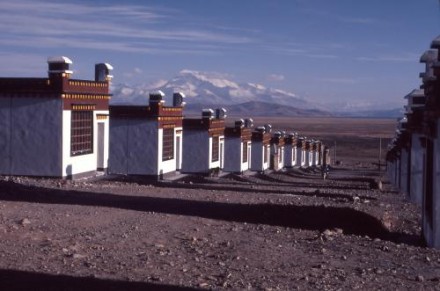DHARAMSHALA: Following his official visit to China from 15-23 December, the UN Special Rapporteur on the right to food, Mr Olivier De Schutter, has encouraged the Chinese government to reassess its policies in Tibet and Inner Mongolia which he said “leave the nomads with no other options than to sell their herd and resettle”.

“…While there is little doubt about the extent of the land degradation problem, the Special Rapporteur would note that herders should not, as a result of the measures adopted under the tuimu huancao policy (“removing animals to grow grass”), be put in a situation where they have no other options than to sell their herd and resettle,” Mr Schutter said in his report.
“The International Covenant on Economic, Social and Cultural Rights prohibits depriving any people from its means of subsistence, and the 1992 Convention on Biodiversity acknowledges the importance of indigenous communities as guarantors and protectors of biodiversity (Art. 8 j). China has ratified both of these instruments,” the report noted.
“The Special Rapporteur encourages the Chinese authorities to engage in meaningful consultations with herding communities, including in order to assess the results of past and current policies, and examine all available options, including recent strategies of sustainable management of marginal pastures such as the New Rangeland Management (NRM) in order to combine the knowledge of the nomadic herders of their territories with the information that can be drawn from modern science,” it said.
“The Special Rapporteur also encourages the Chinese authorities to invest in rehabilitating pasture, and to support remaining nomads with rural extension. The potential of livestock insurance programmes should also be explored, as tested successfully in Mongolia. Such programs, which pay nomads to restock and recover after a major disaster, encourage nomads to keep herds at much smaller scale as they would not fear losing their herding activity after such disasters if covered by such insurances,” it noted.
The Environment & Development Desk of the Central Tibetan Administration’s Department of Information and International Relations in Dharamsala, which monitors the issue of nomads in Tibet, said the UN report shows that Chinese government policies for Tibetan nomads are unsuccessful.
“The UN Special Rapporteur has underscored the need to involve the herding community in the decision and policy making process, and to put into place livestock insurance programmes,” said Mr Tenzin Norbu, Executive Head of the Environment & Development Desk.
Under the controversial “ecological migration” scheme launched in 2003, the Chinese government is in the advanced stages of relocating between 50% and 80% of the 2.25 million nomads on the Tibetan plateau, British newspaper The Guardian reported in September this year.
In Amdo (Ch: Qinghai), the most Tibetan and pastoral prefectures are Golog and Yushu. In these two regions, according to a report published by the Environment and Development Desk of the Central Tibetan Administration’s Department of Information & International Relations in 2009, Tibetan nomads are now altogether excluded from 40 per cent of the grassland. They have been forced to shift to remote new towns, completely losing their stock, livelihoods and the land that had been leased to them. At the 2006 International Conference on Poverty Reduction and the Important Role for International Cooperation in Sichuan, international development agencies reported that nomads have been coercively removed, excluded from their rangelands and made to settle in rows of houses in rigid lines from the watershed, with no livelihoods, little compensation and nothing to do but watch television.
The Tibetan areas incorporated into China’s Qinghai Province are dotted with resettlement centres, many on the way to becoming “ghettos”. Nomads are paid an annual allowance – of 3,000 yuan (about £300) to 8,000 yuan per household – to give up herding for 10 years and be provided with housing. As in some native American reservations in the US and Canada, they have trouble finding jobs. Many end up either unemployed or recycling rubbish or collecting dung, The Guardian’s report said.
“If I could go back to herding, I would. But the land has been taken by the state and the livestock has been sold off so we are stuck here. It’s hopeless,” said Shang Lashi, a resident at a resettlement centre in Yushu. “We were promised jobs. But there is no work. We live on the 3,000 yuan a year allowance, but the officials deduct money from that for the housing, which was supposed to be free.”
“…Not only are these policies threatening one of the world’s last systems of sustainable pastoralism, but scientific evidence shows that these policies are threatening the survival of the rangelands and Tibet’s biodiversity. Chinese, Tibetan and Western scholars concerned about the impacts of these policies have pointed out that settling nomads runs counter to the latest scientific evidence on lessening the impact of grasslands degradation, which points to the need for livestock mobility in ensuring the health of the rangelands and mitigating negative warming impacts,” said International Campaign for Tibet (ICT), a human rights group based in Washington DC.
“There is an increasing consensus among Chinese, Tibetan and Western scholars that the traditional ecosystem knowledge of nomadic pastoralists protects the land and livelihoods and helps restore areas already degraded. The involvement of Tibetans – and nomads in particular – is essential to sustaining the long-term health of the ecosystems and water resources that China and Asia depend upon,” ICT said.
